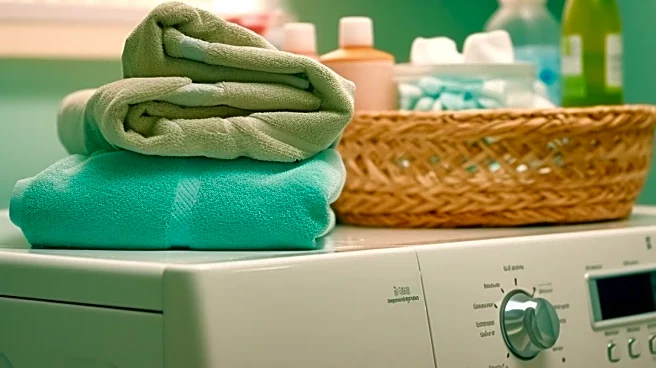What's Happening?
Consumer Reports has provided a series of recommendations aimed at reducing costs associated with laundry, a household chore that can be surprisingly expensive due to water and electricity usage. Rich Handel, a laundry expert from Consumer Reports, suggests
using high-performing detergents, which are super concentrated, requiring only about three tablespoons per load. Tide Plus Ultra Stain Release is recommended for tough stains, while Costco's Kirkland Signature detergent is noted for its cost-effectiveness. Handel advises against using fabric softeners and dryer sheets due to their potential to leave residues and affect machine performance. He also recommends using cold water to save energy and preserve fabric quality. For drying, using the automatic cycle setting or opting for air drying methods like clotheslines can further reduce energy consumption. Additionally, cleaning the dryer's lint filter regularly can enhance drying efficiency and lower energy bills.
Why It's Important?
The advice from Consumer Reports is significant as it addresses the financial and environmental impacts of laundry practices. By adopting these cost-saving measures, consumers can reduce their household expenses and contribute to energy conservation. The emphasis on using cold water and avoiding fabric softeners aligns with broader efforts to promote sustainable living by minimizing energy use and chemical residues. These practices not only help in cutting down utility bills but also support environmental sustainability by reducing the carbon footprint associated with household chores. The recommendations are particularly relevant for families and individuals looking to manage their budgets more effectively in the face of rising utility costs.
What's Next?
Consumers may begin to adopt these practices more widely, potentially leading to a shift in purchasing habits towards more efficient laundry products and appliances. Retailers and manufacturers might respond by promoting energy-efficient models and eco-friendly detergents. Additionally, there could be increased interest in alternative drying methods, such as clotheslines, which may see a resurgence in popularity. As awareness grows, there may be further innovations in laundry technology aimed at enhancing efficiency and reducing environmental impact.
Beyond the Headlines
The recommendations from Consumer Reports highlight a broader trend towards sustainable consumer practices. As individuals become more conscious of their environmental impact, there is likely to be a growing demand for products that align with eco-friendly values. This shift could influence market dynamics, encouraging companies to prioritize sustainability in product development and marketing strategies. The focus on reducing energy consumption and chemical use in laundry also reflects a cultural shift towards more mindful and responsible living.
















